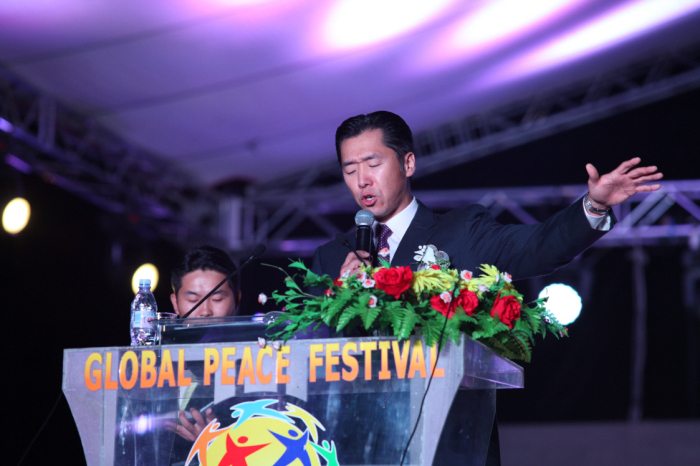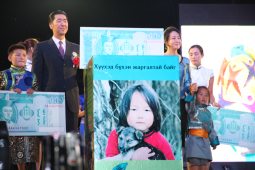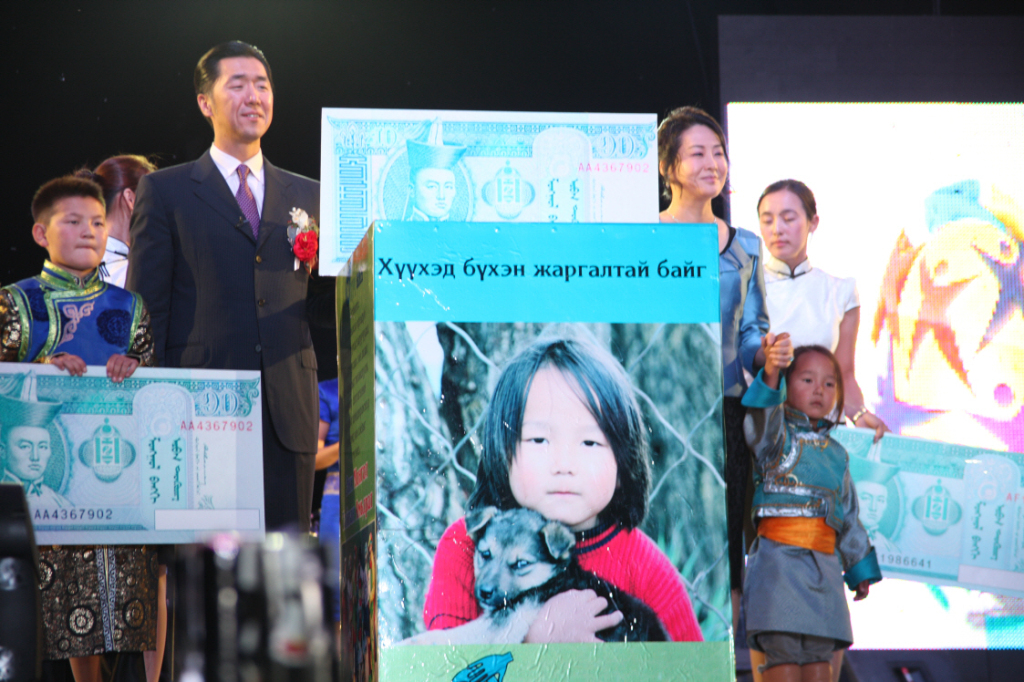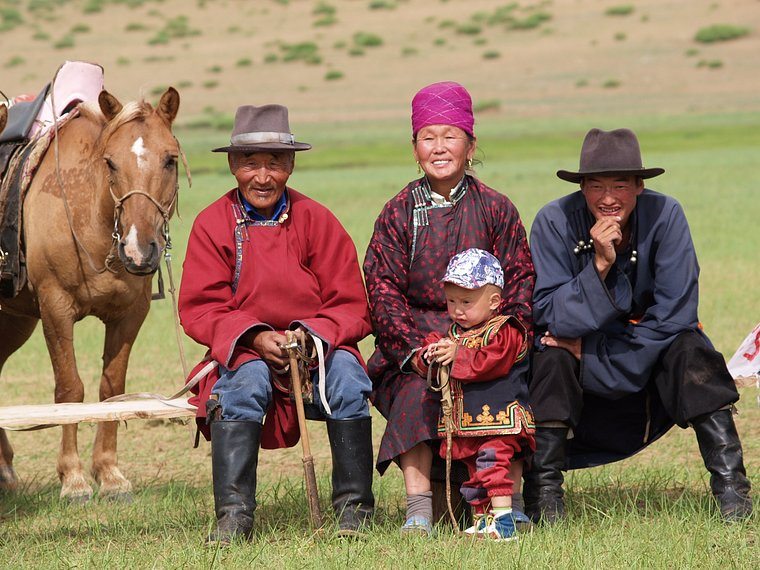Opening Address by Dr. Moon at the Global Peace Leadership Conference in Mongolia
The following address was delivered at the opening plenary of the Global Peace Leadership Conference hosted in Ulaanbaatar’s Sukhbaatar Square, Mongolia on August 26, 2011.
Introduction
 Your Excellencies, Ladies and Gentlemen. Welcome to the vast steppes of Mongolia for this historic Global Peace Festival.
Your Excellencies, Ladies and Gentlemen. Welcome to the vast steppes of Mongolia for this historic Global Peace Festival.
Celebrating the 2,220th year anniversary of the Hun dynasty as well as the centennial of Mongolian independence, this festival, in conjunction with the Global Peace Conference to be held later in Seoul, will introduce new approaches and insights to a Northeast Asian peace initiative centered upon a successful resolution to the ongoing crisis of the Korean peninsula. It will highlight Mongolia’s unique historic, cultural, and diplomatic status in the region, marking its important role as a leading advocate for peace, human rights, the rule of law, and the democratic process.
This is truly a momentous occasion for Mongolia and I am honored to recognize its leaders who made this festival and conference a reality. I would like to thank my friend President Elbegdorj for his support of the preparations for the Global Peace Festival of the Hun Origin People and the Global Peace Leadership Conference in addition to acknowledging the bold leadership of this nation’s Prime Minister Batbold in promulgating the official government decree sponsoring these events. I would also like to extend our appreciation to the Minister of Foreign Affairs and Trade, Zandanshatar, for his important leadership and to recognize the work of our co-sponsoring organizations, the World Mongolian Convention and the Mongolian Peace and Friendship Union, represented here by Ambassador Tsakhilgaan and Ambassador Gombosuren.
May we give Minister Zandanshatar and the leadership of our host nation a warm round of applause?
We are honored to be joined by so many of the leading statesmen, academics, social activists and religious leaders from more than 30 different nations throughout the region and world.
And, given the regional importance of this festival in promoting peace, I believe specific mention needs to be made to the organizers of the historic Parliamentary Roundtable on Northeast Asia peace. I would like to thank and applaud the leadership of MPs Ochirbat and Ganbyanba of Mongolia’s State Great Hural, National Assemblywoman Young-sun Song of the Republic of Korea and Congressman Eni Faleomavaega, the Ranking Member of the US House of Representatives Asia Subcommittee. Their devotion to peace and stability in this region is commendable and we hope that their deliberations with their parliamentary counterparts will establish a framework for peace and prosperity for all people of Northeast Asia.
Let us join together to give all the parliamentarians who have joined us here today a warm round of applause and encourage their significant work.
Unique Heritage and Position of Mongolia
It is a great pleasure to return to Mongolia following the first Global Peace Festival held here over three years ago. The Global Peace Festival Foundation has convened leadership conferences, festivals for peace, and ongoing social impact programs in 30 nations and seven continents around the world. In less than four years, it has established itself as a globally recognized peace brand, working locally, regionally and internationally with governments, NGOs, religious organizations, social activists, businesses, academics and the media to promote a world of peace through the vision of “One Family Under God.”
GPFF is honored to be partnering with the Mongolian government and leading NGOs in this year’s historic Festival to celebrate the 2220th anniversary of the Hun Empire and the 100th anniversary of Mongolia’s restored independence. As you are aware, the creation of the Hun Empire in the 3rd century BC and the Mongol Empire in the 13th century were directly attributable to the need to end the incessant violence and conflict between the steppe clans and their lawless neighbors. Both Modun Shanyu and, later, Chinggis Khan yearned to bring peace by uniting the people of their worlds under “One Heaven.”
In particular, Chinggis Khan’s accomplishments in setting the stage for a Pax Mongolia are impressive even by modern standards of human rights and fundamental freedoms. Hundreds of years before the Reformation and the Enlightenment in Europe and, later, the creation of the United States, the vast continent of Eurasia saw the longest sustained reign of peace under the Mongol Empire. Central to this peace was a system of Great Laws which recognized the sanctity of human life, the importance of individual merit and effort and the family unit, as well as the freedom of trade, thought and religion.
Today Mongolia has crossed the threshold from its glorious past to the present. Modern Mongolia has already offered important examples to the world. In 1990, Mongolia made a transition from a single-party communist system to a multi-party democracy without violent civil conflict. It was a revolution of historic proportions, but the Mongolian character molded from the vast steppes and their nomadic past yearned for the freedom which could only be found in a western style democracy and the capitalist system. Since then, unlike other young democratic nations, it has held elections and changed governments several times without major disturbances. It is not surprising, then, that Mongolia, although fairly new to democracy, was recognized this year as the chair of the Community of Democracies. Let’s give Mongolia a round of applause.
 It is also boldly making the transition to a free market economy with all its rewards and challenges. Its abundance of natural resources and pristine natural beauty is fueling industries in the mining, agriculture, tourism and service sectors as well as stimulating major direct foreign investments in infrastructural and industrial development. The Mongolian “gold rush” is at full steam but it is also followed by a growing concern about irresponsible stewardship of the environment. Unlike some developing nations where the ideas of conservation and natural resource management are foreign concepts, it has been a way of life here in Mongolia for thousands of years and for many generations as nomadic herdsman carved out a living in these lands. With this heritage, Mongolians are leading the way in setting a standard for good natural resource governance.
It is also boldly making the transition to a free market economy with all its rewards and challenges. Its abundance of natural resources and pristine natural beauty is fueling industries in the mining, agriculture, tourism and service sectors as well as stimulating major direct foreign investments in infrastructural and industrial development. The Mongolian “gold rush” is at full steam but it is also followed by a growing concern about irresponsible stewardship of the environment. Unlike some developing nations where the ideas of conservation and natural resource management are foreign concepts, it has been a way of life here in Mongolia for thousands of years and for many generations as nomadic herdsman carved out a living in these lands. With this heritage, Mongolians are leading the way in setting a standard for good natural resource governance.
Most of all, we are here today because Mongolia lies at the heart of the most volatile, geopolitically and economically charged region in the world. Nevertheless, it maintains good diplomatic relations with all major international and regional powers, particularly with both North and South Korea. Its recent history serves as a successful model of a peaceful transition from a communist political and economic system to a democratic political process and market-oriented economy. In addition, it’s unique past and the open-minded and friendly character of the Mongolian people puts it in a natural position to arbitrate the historic, diplomatic, ideological, political, economic and cultural divide which continues to plague this region.
The Importance of Universal Aspirations, Principles and Values
Ladies and gentlemen, the yearning for fundamental human rights and freedoms is a basic human aspiration that has been the motivation for all humanitarian and peace-building efforts around the world since after the Second World War. With the creation of the United Nations in 1945 , the global community has made great efforts to elevate the human condition through political, diplomatic and economic frameworks that address the symptoms of an ailing humanity, such as poverty, disease, environmental degradation, conflict and war. Yet, today, even after 66 years, people on every continent still experience hunger, lack basic medical care, endure violence on a daily basis. In my view it is fair to say that the United Nations, although founded upon lofty principles, has not fulfilled the mission it set out to fulfill.
Mongolia’s unique past and the open-minded and friendly character of the Mongolian people puts it in a natural position to arbitrate the historic, diplomatic, ideological, political, economic and cultural divide which continues to plague this region.
This critique of the UN is not to say that we should abandon these lofty goals or the institution, but to suggest that we need to explore new solutions and alternatives to accomplish a peaceful world. Some have proposed that scientific advancements in technology during this age of globalization, the internet, and social networking could dramatically improve the lives of average people by giving them instant access to information, trends and events around the world. These tools were a catalyst to the historic events unfolding in North Africa and the Middle East. Yet, it did not provide the means to bring a peaceful transition or end the still ongoing civil strife in that region.
Ladies and Gentlemen, at the end of the day, conflicting parties need to come together upon “common ground” for any serious dialogue to occur. We must recognize that the most fundamental human problems cannot be solved by politics, diplomacy, economics, or even science alone. Sustainable solutions ultimately must address root causes and, thus, must include the intrinsic spiritual dimension of the human experience. Simply put, political authority cannot mandate, nor can money buy the virtues needed to resolve conflicts and build ethical and moral societies. Qualities such as compassion, forgiveness, respect, responsibility, integrity and, most of all, living for the sake of others, must be genuinely motivated by the heart and the human spirit. Thus, we need to establish a new framework for peace rooted in spiritual aspirations, principles and values which could be the common ground for disparate parties to meet.
In our post 9-11 world, there are many concerns about conflicts rooted in extremist, divisive doctrines and exclusivist practices promoted in the name of religion. What is needed today is a new perspective that recognizes the distinction between a greater spirituality versus a narrow religious advocacy for one’s own sectarian views. All human beings have an innate spirituality which is an essential dimension of life whether or not they hold any religious affiliation or are part of any organized religion. It is important to note that our modern notions of fundamental human rights and freedoms came from such a spiritual perspective.
Spirituality is a basis of fundamental truths – the universal aspirations, principles and values acknowledged by all people, regardless of race, regardless of nationality, regardless of ethnicity and most of all, regardless of religion. For me, the clearest evidence and greatest lessons about this essential spirituality are found in nature. In the wilderness, one comes to understand that there is an essence to life far greater than things in our material lives. That is why I go to the mountains when I want to reflect deeply and renew my spirit. I believe this is also why I feel so at home in Mongolia, because your culture is infused with an appreciation of nature and an innate spirituality expressed in the creation.
There are immutable principles and laws which govern the natural universe. These principles are also the foundation for a just, ethical and peaceful world. It is vital that we seek greater understanding of these principles, as they can form the basis for a universally shared value system, ultimately a global ethic. At this time of greater integration through globalization and technology, there are contravening forces of increasing social, cultural and religious fragmentation. Therefore it is essential to establish shared aspirations, principles and values as the common ground for cohesion within society and the peaceful resolution of conflicts.
United States and the Modern World
Ladies and gentlemen, in examining the history of the last century, one development that stands out is the remarkable rise of the United States and its influence throughout the world. In its relatively short history, America has become the proverbial “city on the hill” where the diversity of humanity congregated to realize the “American dream.” What is the American dream? The key to understanding the American miracle is not solely attributable to the democratic and capitalist system of governance and commerce. Those systems were but “empty vessels” where the spiritual aspirations, principles and values of a new nation were poured.
The most often cited secular document to champion the cause or idea of “inalienable rights”-which became the basis of our modern notion of human rights and freedoms – the Declaration of Independence It states that “we hold these truths to be self-evident, that all men are created equal, that they are endowed by their creator with certain inalienable rights, and that among these are life, liberty and the pursuit of happiness.” Thus, essential human rights are not granted by any human institution but by the Creator and, therefore, cannot rightfully be denied or abridged by any government.
Our diverse and fragmented world sorely needs a universal application of such a model that transcends the divisive attributes of race, ethnicity, nationality and religion. Such a vision is expressed in a simple phrase that holds profound meaning, that phrase is: One Family under God. Thank you very much.
The transformative power of the vision to create One Family under God is found in the fundamental truth that all people, regardless of their differences are spiritual beings who share a common heritage in the one Creator. This powerful idea and vision is being advanced by the Global Peace Festival Foundation (GPFF) and its partners, and is resonating with people from diverse backgrounds on virtually every single continent.
Mongolia’s role is crucial. Unlike the participants of the Six Party Talks which have been polarized with vested historic, ideological, and strategic interests, Mongolia is a friend to all those participants with no vested interests besides the desire to broker good will, dialogue and cooperation. In addition, it has diplomatic relations and open contacts with both Koreas.
We have reached an inflection point in history with circumstances ripe for a paradigm shift of monumental proportions. Whether this affects our century in a positive or negative manner depends on the choices we make today. As a man of faith, I cannot but feel the hand of divine providence guiding these developments. At the same time, I feel the urgency for a new generation of global leaders to step forward and to make their mark in history. I submit to you that the deciding factor at such times is always moral and innovative leadership, on every level. Such leadership exists to promote a “greater good” that can benefit not only individuals but the larger society, nation and world.
Moral leadership provides the roadmap for nation building by outlining a vision rooted in universal aspirations, principles and values, while innovative leadership provides the methods in which that vision can be realized. Both are like two sides of the same coin.
Unique Context and Challenge for Peace on the Korean Peninsula
Such leadership is nowhere more needed today than in addressing the issues on the Korean peninsula. Without a resolution to this longstanding stalemate, there can be no guarantee of peace and stability in the wider region.
After almost 60 years, there is still no official peace treaty ending the Korean War. In fact, the peninsula remains a source of instability not only for the region but globally. The past year has been perhaps the most contentious conflict in recent memory on that peninsula, with military clashes frequently making global headlines. The time is ripe; therefore, to explore new approaches to advancing peace and stability on the peninsula and the greater region through alternative track two efforts and cultural exchanges that can help mitigate tensions on the Korean peninsula. In that context, the Global Peace Leadership Conference and its theme, “Mongolia and Northeast Asia Peace,” is both timely and fitting.
Mongolia’s role is crucial. Unlike the participants of the Six Party Talks which have been polarized with vested historic, ideological, and strategic interests, Mongolia is a friend to all those participants with no vested interests besides the desire to broker good will, dialogue and cooperation. In addition, it has diplomatic relations and open contacts with both Koreas. Thus, given the current impasse and possibility of future disagreements down the road, Mongolia can play a unique role that countries like the United States, Japan, China and Russia could not fulfill. It is well-suited for an emerging role in developing innovative initiatives and best practices for reconciliation and development in the region, because of its historical background and geopolitical position as well as its own recent experiences.
Your collective discussions as parliamentarians, senior governmental officials, scholars, business people and civil society representatives should bear fruit in practical proposals for initiatives that can open doors and create new opportunities for a peaceful future in the region.
Northeast Asia and Korean Peninsula Peace Initiative
We must be cognizant that our world has entered the Pacific Rim era in which the nations in Asia along with the United States must find common cause. What happens with North and South Korea is inextricably linked to the surrounding actors of Russia, China, Japan, Mongolia and the larger neighborhood of nations including the United States and ASEAN countries.
The challenge in mounting an enduring peace on the Korean Peninsula and across Northeast Asia must begin with recognition of the massive gulf in economic status between both Koreas. In the case of Germany’s reunification, this was a paramount challenge that had to be overcome. Beyond the enormous cost factors of reunification, a far larger challenge is presented in the area of culture. In the German case, East and West had vastly different ideologies and cultural practices despite their common history prior to the Cold War.
Hence in my earlier remarks I outlined a peace-building vision rooted in universal principles and values which are the essential foundation for peace. We must form this common framework for peace and advance new track two cultural diplomacy that fully engages the values-generating institutions of civil society. These institutions include our families, NGOs and faith-based institutions, academia and the private sector working in partnership with parliaments, governmental entities and the United Nations.
This Global Peace Leadership Conference and GPFF’s ensuing Global Peace Convention in Seoul have begun to frame and generate a whole array of partnerships across Northeast Asia and its surrounding neighbors. Our GPF Northeast Asia and Korean Peninsula Peace Initiative is being launched at this global conference with a range of public-private partnerships together with Mongolia and representatives from more than 30 different nations. This new track two peace initiative of civil society joining in partnership with national governments, corporations and philanthropy has already established a track record for conflict resolution and peace in hot spots around the world.
Young people have the greatest capacity to dream big and think outside the box of past enmities. I want to congratulate the more than 500 leaders assembled here this morning from Northeast Asia who are the vanguard of these cultural exchanges. The International Youth Convention and Global Peace Youth Corps are equipping the next generation of peacebuilders working on college campuses and in community service projects to demonstrate living for the greater good beyond one’s own nationality or ethnic group.
I am also pleased to announce that the Dream Camp located here in Mongolia will be working with the Youth and Sports Ministries across the region, the International Peace Sports Foundation, Asia Football Conference and other GPF partners to develop a Northeast Asia Sports for Peace tournament in 2012. Thank you.

Launch of the “Power of 10 Turgrik” campaign during the celebration of the Hun People’s Origin festival in 2011.
GPFF’s Character Competency Initiative is supporting ongoing character education partnerships with schools and communities not only here in Mongolia but across Asia, Africa, Latin America and the United States. The Power of Ten Turgik initiative has engaged tens of thousands of Mongolians in serving and supporting programs that help needy Mongolian children fulfill their dreams.
Today, we are also announcing that the GPConnect arm of GPFF will be establishing a regional center to support innovative models of community-driven development. We are also laying the groundwork for a Northeast Asia Peace Service Corps. Young people, starting here this week in Mongolia, have commenced cross border service projects including tree planting to combat desertification, tackling challenges that face not only Mongolia but North and South Korea as well as China. Over one million trees will be planted, tree nurseries will be launched and partnerships established with ministries, embassies, corporations and NGOs.
We are collaborating on community driven development with the Office of the President to further equip emerging leaders with best practices that can be seen across all of Northeast Asia on a regional basis and internationally through the Community of Democracies.
I am very pleased that a key part of this conference is the launch of the Northeast Asia Parliamentary Roundtable that includes not only Mongolia and its surrounding neighbors but parliamentarians from Southeast, South and Central Asia, the United States as well as Africa.
Our Northeast Asia and Korean Peninsula Peace Initiative will support the Mongolian government’s proposal for a new Northeast Asia dialogue mechanism for peace, such as the ASEAN and European communities have developed.. Through collaborations with think tanks, universities and other experts in the world of policy and academia, the best minds in the field of peace and security are being assembled to support these initiatives and Mongolia’s role in the Northeast Asia peace process.
Today’s sessions will also include the launch of an important global forum on “Peace through Trade and Investments.” I am pleased that a number of companies from Mongolia, Korea and other nations have joined this important forum, including the noted founder of the East Africa Business Alliance, my good friend Dr. Manu Chandaria.
Conclusion
We stand at a crossroads in history. The choices we make today and the leadership we exhibit, will have far-reaching impact on the future peace in the region and the world.
The Mongolian people have a rich and proud history, a strong spiritual heritage, and deep family traditions. Mongolia is now poised to play a unique role as a leader for global peace which we will celebrate tomorrow at the culminating Global Peace Festival of the Hun Origin People.
I encourage you to put your best ideas, talents as well as resources in the deliberations of this conference and its culmination which will be the Ulaanbaatar Declaration. We are pleased to announce that the Global Peace Convention in Seoul Korea this November 28-30 will continue these deliberations and action oriented partnerships to further advance the Northeast Asia and Korean Peninsula Peace Initiative. I would like to welcome you to my homeland of Korea in November.
Ladies and gentlemen: Let us join together with the proud Mongolian people to create a new dawn of peace beginning here in Northeast Asia that can cast a bright ray of hope for all the world’s peoples.
Thank you very much.

